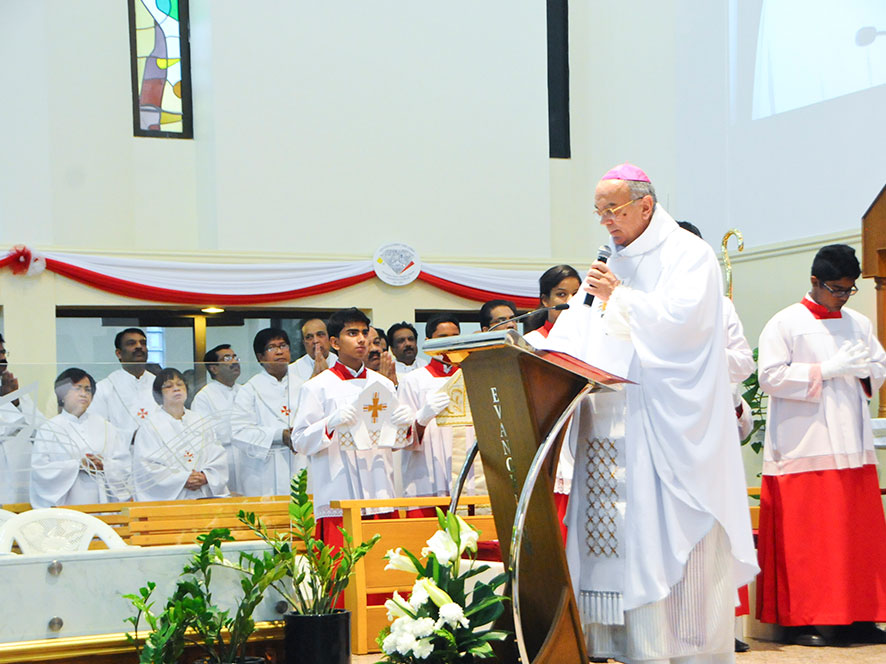Paul’s encounter with the pagan world at Philippi is a string of unexpected vicissitudes. There is also the new thing of a world made up of slaves and masters. This will make Paul understand that God’s wisdom and power differ from the world’s, like life from death. The only strength of the evangelizers is to live out what they proclaim. They share the mystery of the Just One who overcomes evil with good. Hence persecutions, beating, imprisonment and death threats; but also resurrection for convicts and birth into a new life for jailers. If we can say that the first church in Europe is Lydia’s house, the second is the prison where the jailer has his home.
Paul and companion go towards the river to pray. Along the way, it is “a divining spirit” who takes up the task of “evangelizing.” The Greek consider it good, “a demon;” but, for the Jews, it is an evil spirit, a devil. Also in the Gospels, the demons are the first to proclaim Jesus as God. But Jesus orders them to be silent. It is a temptation. God reveals Himself from the Cross. Only there, on the Cross, is the manifesto of His power: love that serves and gives life. Our power, instead, is egoism that enslaves and gives death. Human beings want to be like God. But what kind of God? The One Satan advertizes from the tree in the garden of Eden (Genesis 3:1ff), or the One revealed from the tree of the Cross? Even Peter is called Satan because he wants a powerful God (Matthew 16:16-23). It is what merely human religions affirm and atheists rightly deny.
Paul chases away the demon from the slave girl even while she is giving him a free promotion. But her masters, having lost their source of income, accuse Paul to be a troublemaking Jew. Paul and Silas are beaten up and put in the wooden stocks inside the deepest part of the prison, as in a tomb. Even the Christ who triumphs over the “nets and chains,” by which Satan imprisons everybody, is nailed to the wood of the Cross. The nightly earthquake, which opens all doors and unties stocks and chains, is a resurrection scene. The whole passage is a liberation and salvation interplay. The woman is freed from the evil spirit and the convicts, from stocks and chains. The jailer, in turn, is freed from death, baptized and saved with his whole household. While the exorcism shows Christ’s triumph over paganism, the liberation of the convicts and their guardians – (In this world, all of us are somehow both convicts and jailers!) – shows that God wants to free humanity from all types of slavery.
The scene is similar in Acts12:3-17. The mission to the pagans is God’s work: nothing can stop it: neither beatings, nor stocks, chains, prison. The demons themselves can’t help favoring it. In front of goodness, evil dissolves like darkness in front of light.
The town of Philippi, Roman colony, is a “useful context” for the confrontation between the Gospel and the pagan world. Long have the Jews “inculturated” themselves, even if not without difficulty. As a matter of fact, they are looked upon with suspicion. The anti-Jewish tendency is ages old. Although Judaism is “religio lecita” (a religion which is allowed to exist), all the same, the anti-Jewish tendency is widespread and touches also the Jews-Christians Paul and Silas. After Constantine’s edict, Christianity has become a state religion and has, unfortunately, inherited the anti-Jewish prejudice proper of all the powerful who fear those who are free.
The Church in Europe starts with simple and common people: a Jewish woman-trader and a pagan jailer. God reveals Himself to poor and simple people, but hides Himself from the worldly wise and powerful. “God chose what is low and despised in the world, even things that are not, to bring to nothing things that are” (1 Corinthians 1:28). The Christian message attracts everybody because it shows the Crucifix. He is the “Son of Man” who identifies with every person. In Jesus, even the least of human beings can recognize Himself. Even God himself. As a matter of fact, if you take away from people what they have, what they are will remain: simple human beings. And human beings, as such, are the only image and likeness of God.
© Popoli – www.popoli.info



















